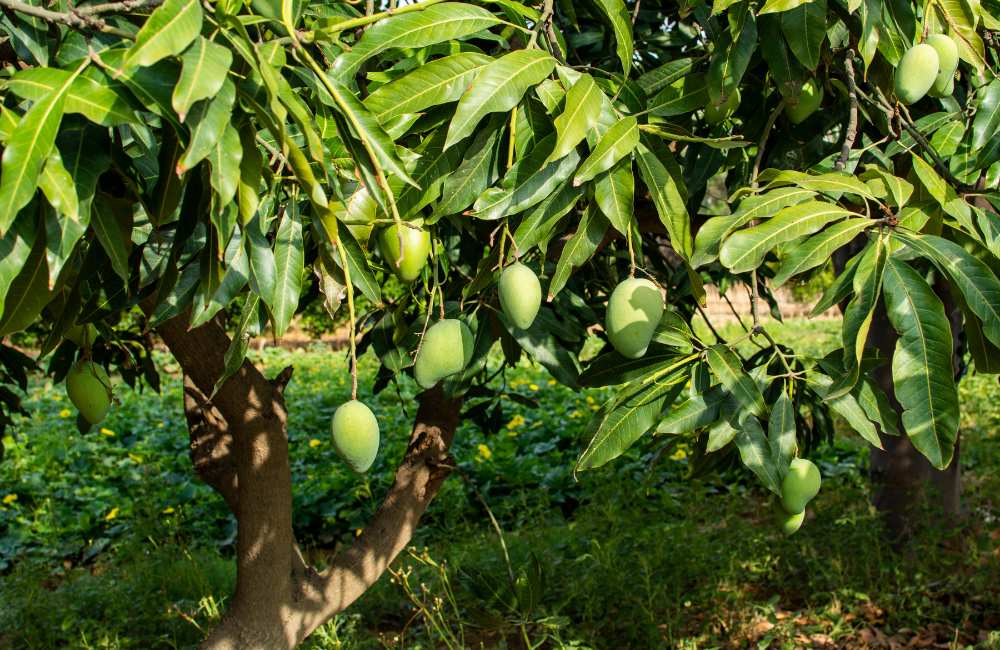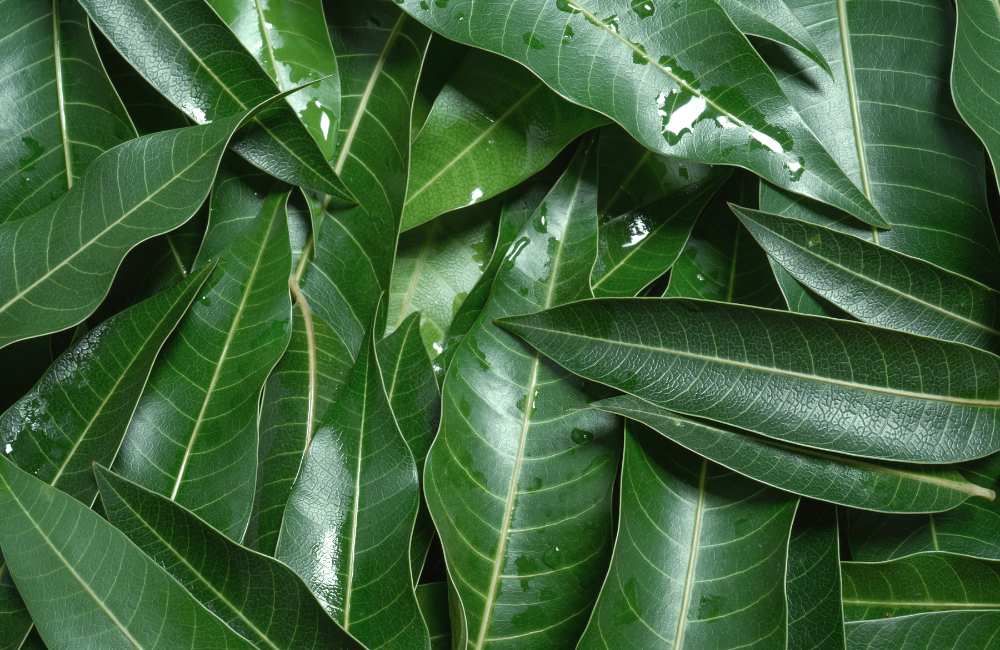You are probably familiar with mangoes but you might not know much about the benefits of mango leaves. Mango, as everyone calls it, is a very popular sweet, edible fruit that comes from mango trees.
Botanically, mango is a drupe (consisting of an outer skin, a fleshy edible portion, and a central stone enclosing a single seed)- also called stone fruit.
Mango is an evergreen tree belonging to the family of Anacardiaceae and has been adjudged as a vital, traditionally significant and one of the most economically important tropical fruit crops globally.
The largest mango-producing countries are India, China, Thailand, Indonesia, Pakistan, Mexico, Brazil, Bangladesh, Nigeria and the Philippines.
Our concentration here is on mango leaves. Many people do not realize that the leaves of mango trees are edible just as the fruits.
The young leaves are very tender, so they are usually cooked and eaten in some cultures. The leaves are considered nutritious which is why they are used to make tea and supplements.
They are reddish or purplish when tender and new, grows into dark green colour and have a pale underside when mature.
The leaves of mango (Mangifera indica), particular specie has been used in healing practices like Ayurveda and traditional Chinese medicine for thousands of years.
Nutritional composition of mango leaves
The leaves are a potential source of minerals:
- Nitrogen
- Potassium
- Phosphorus
- Iron
- Sodium
- Calcium
- Magnesium
- Vitamins A, B, E, and C.
- Protein
- Sulphur
- Zinc
Bioactive components of mango leaves
Phytochemicals present in mango leaves can be broadly categorized as polyphenols, terpenoids, carbohydrates, sterols, carotenoids, vitamins, fatty acids and amino acids. Among them, total phenolic compounds including phenolic acids, xanthones, benzophenones, tannins, terpenoids, and flavonoids are the most abundant.
Several epidemiological studies have proved the activities of the TPC (Total Phenolic Compounds) against chronic diseases like cancer, diabetes, and cardiovascular and neurodegenerative diseases.
Traditional uses
Traditionally, the young leaves are very tender, so they are cooked and eaten in some cultures. They are considered nutritious and as such are employed in the preparation of tea and supplements. Let us look at some of the health benefits that have scientific backing.
Health benefits of mango leaves
-
Rich in plant compounds
Mango leaves contain several beneficial plant compounds, including polyphenols and terpenoids as mentioned earlier. Terpenoids are important for optimal vision and immune health, they are also antioxidants, which protect your cells from harmful molecules called free radicals.
Polyphenols on the other hand have antioxidant and anti-inflammatory properties. Some research suggests that they improve gut bacteria and help treat or prevent conditions like obesity, diabetes, heart disease and cancer.
Mangiferin, a polyphenol found in many plants but in especially high amounts in mango and mango leaves, is credited with numerous benefits.
Studies have investigated it as an anti-microbial agent and a potential treatment for tumours, diabetes, heart disease and fat digestion abnormalities. Further human research is needed in this regard before any logical conclusion.
-
Regulate diabetes
The leaves are very useful for managing diabetes. For medicinal purposes, please ensure you use the tender leaves of the mango tree. They contain tannins called anthocyanidins that may help in treating early diabetes.
This is also possible due to its effects on fat metabolism. Elevated triglyceride levels are often associated with insulin resistance and type 2 diabetes.
The leaves are dried and powdered or used as an infusion to treat the same. It also helps to treat diabetic angiopathy and diabetic retinopathy.
To use, soak the leaves in a cup of water overnight. Strain and drink this water to help relieve the symptoms of diabetes. It also helps in treating hyperglycemia.
-
Lowers blood pressure
Mango leaves have hypotensive properties and as such can be used to lower blood pressure. They help in strengthening the blood vessels and treating the problem of varicose veins.
-
Fights restlessness
The leaves can be a good home remedy for people suffering from restlessness due to anxiety. You can bathe with water infused with the leaves.
-
Treats gall and kidney stones
Mango leaves help treat kidney stones and gallbladder stones. The daily intake of a finely ground powder with water kept in a tumbler overnight helps in breaking the stones and flushing them out.
-
Cures respiratory problems
Mango leaves are good for all kinds of respiratory problems. It is especially useful for people suffering from colds, bronchitis and asthma. Drinking a decoction made by boiling leaves in water with a little honey helps to cure cough effectively. It also helps in curing voice loss.
-
Treats dysentery
Mango leaves have been used to treat bleeding dysentery. To use this, the leaves dried in shade should be powdered and then taken with water two to three times a day to stop dysentery.
-
Good home remedy for earache
Earaches can be quite painful and frustrating. Using leaves at home provides good relief. To use the leaves for this, you have to extract a teaspoon of the juice and drop it into the ear. Heat the juice slightly before use.

-
Heals burns
The simplest remedy for healing painful burns is to apply mango leaf ashes to the wounded area. This soothes the skin and brings relief.
-
Stop hiccups
Hiccups can be troublesome. If you are troubled by frequent hiccups or other throat problems, mango leaves can be a great home remedy. To use it for this, burn a few mango leaves and inhale the smoke. This helps to cure hiccups and throat problems.
-
Good for your gut health
Regular intake of a concoction of mango leaves left overnight in warm water, first thing in the morning on an empty stomach, acts as a good stomach tonic, flushes out toxins from your body and keeps your stomach clean.
-
Protects against fat gain
Mango leaf extract may help manage obesity, diabetes, and metabolic syndrome by interfering with fat metabolism. Some research with animals has been able to be demonstrated that mango leaf extract inhibits fat accumulation in tissue cells.
Another study was able to show that cells treated with mango leaf extract had lower levels of fat deposits and higher levels of adiponectin (a cell signalling protein that plays a role in fat metabolism and sugar regulation in your body). Higher levels may protect against obesity and obesity-related chronic diseases.
-
Anti-inflammatory properties
The anti-inflammatory properties lie in the mangiferin content. Inflammation is part of your body’s normal immune response; chronic inflammation can increase your risk of various diseases.
Animal studies suggest that mango leaves’ anti-inflammatory properties may even protect your brain from conditions like Alzheimer’s or Parkinson’s.
-
Anticancer properties
Multiple reviews demonstrate that the mangiferin in mango leaves may have anticancer potential, as it combats oxidative stress and fights inflammation.
Mango bark equally exhibits strong anticancer potential due to its lignans, which are another type of polyphenol. These are all preliminary tests and mango leaves should not be considered a cancer treatment.
-
Treats Stomach Ulcer
Mango leaves and other parts of the plant have historically been used to aid stomach ulcers and other digestive conditions.
-
Supports healthy skin
Mango leaf extract may reduce signs of skin ageing due to its antioxidant content. It was discovered through an animal study that mango extract given orally was able to increase collagen production and significantly shortened the length of skin wrinkles. Note that this extract was not limited to the leaves alone.
Mango leaf extract was also seen to be effective in tackling Staphylococcus aureus, bacteria found on the skin that may cause Staph infections. Mangiferin has good wound-healing properties.
How to use mango leaves
The most common way of using mango leaves is to consume them as tea. To prepare your mango leaf tea at home, boil 10-15 fresh mango leaves in 2/3 cups (150ml) of water.
If fresh leaves are not available you can purchase mango leaf tea bags and loose-leaf tea. Mango leaf is available as a powder, extract and supplement. The powder can be diluted in water and drunk, used in skin ointments, or sprinkled in bathwater.
There is a mango leaf capsule called Zynamite, which comprises of 60% or more mangiferin. The recommended dosage is 140-200 mg 1-2 times daily.
Side effects of mango leaf
No doubt, there is no possible side effect of mango leaves observed but there are things one needs to look out for while using mango leaves:
- Mango leaves are considered to be among Ayurvedic medications and to date there are no such severe side effects recorded while using them. It is advised to use a limited number of leaves to obtain the accurate health benefits of fresh mango leaves as it contains some number of chemical elements.
- If you observe any kind of allergic reaction then avoid the juice, tea or even the powder of mango leaves and consult your doctor immediately.
Conclusion
Mango leaf powder and tea are considered safe for human consumption but limited studies in animals suggest no side effects, though human safety studies have not been conducted.
The leaves are packed with several antioxidants and plant compounds. Though research is preliminary, mango leaves may have benefits for skin health, digestion and obesity.
Mango leaves can be eaten raw, however, in the West, they are often consumed as a tea or a supplement. Please note that this write-up is not in any way intended to make you replace your prescription medicine with mango leaves. It is strictly for educational purposes.
Always check with your healthcare provider if you want to start taking any mango leaf supplement or any other form of a mango leaf. Thank you!

